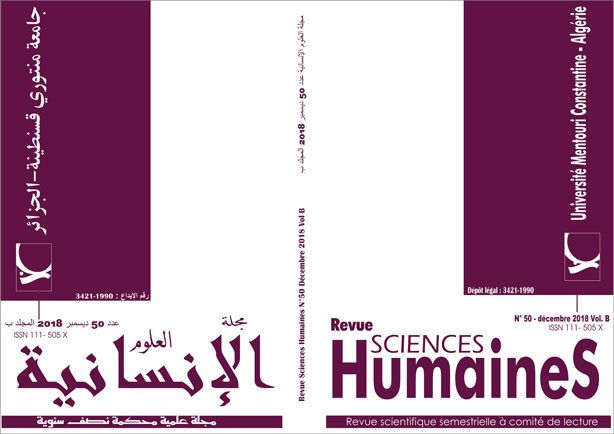The Role of Written Corrective Feedback in Enhancing Students’ Proficiency in Writing: Case of Second Year Students,University of Constantine 1
Keywords:
written corrective feedback, coded feedback, un, peer feedbackAbstract
Written corrective feedback is of a crucial role to the improvement of students’ writings.Every time their writing teachers provided them with the feedback, students should not hesitate to make use of it to develop their writing. This study discusses the effects of the different types of written corrective feedback in enhancing students’ writing and at finding out the appropriate type of written corrective feedback to be used. This is done through comparing the results of the effects of three types of corrective feedback on students’ written productions. The hypothesis is that ifstudents are provided with un-coded written feedback, coded written feedback, and peer feedback this would result in effective results on the writing performances of students who receive un-coded corrective feedback in comparison to those who receive coded feedback and peer feedback. To test the validity of this hypothesis, the researcher opted for a questionnaire, directed to teachers of writing in the department of Letters and English Language, at the University of Constantine 1Downloads
References
Al Shamsi, R. R. S. S. (2013). English Language Teachers’ Perceptions Regarding Providing Corrective Feedback on Grade 4-8 Students’ Writing in AL AIN Schools, United Arab Emirates. Unpublished Master Thesis,University of United Arab Emirates.
Asassfeh, S. M. (2013). Corrective feedback (CF) and English-major EFL learners’ ability in grammatical error detection and correction. ELT Journal, 6(8), 85- 94.
Ashwell, T. (2000). Patterns of teacher response to student writing in a multiple-draft composition classroom: Is content feedback followed by form feedback the best method? Journal of Second Language Writing, 9(3), 227–257.
Bitchener, J., Young, S., Cameron, D. (2005). The effect of different types of corrective feedback on ESL student writing: Journal of Second Language Writing, 14, 191-205.
Bitchener, J. (2008). Evidence in support of written corrective feedback. In Elwood, J. A., & Bode, J. (2013). Student preferences vis-à-vis teacher feedback in university EFL writing classes in Japan. System. 42, 333-343.
Cardelle, M., & Corno, L. (1981). Effects on second language learning of variations in writtenfeedback on homework assignments. TESOL Quarterly, 15, 251–261.
Chandler, J. (2003). The efficacy of various kinds of error feedback for improvement in the accuracy and fluency of L2 student writing. Journal of Second Language Writing, 12, 267-296.
Ellis, R. (2008). A typology of written corrective feedback types. ELT Journal, 63(2), 97-107.
Elwood, J. A., & Bode, J. (2014). Student preferences vis-à-vis teacher feedback in university EFL writing classes in Japan. System. 42, 333-343.
Falhasiri, M., Tavakoli, M., Hasiri, F., & Mohammadzadeh, A.R. (2011). The effectiveness of explicit and implicit corrective feedback on interlingual and intralingual errors: A case of error analysis of students’ compositions. ELT Journal, 4(3), 251-264.
Ferris, D. R., & Roberts, B. (2001). Error feedback in L2 writing classes: how explicit does it need to be? In Elwood, J. A., & Bode, J. (2014). Student preferences vis-à-vis teacher feedback in university EFL writing classes in Japan. System. 42, 333-343.
Ferris, D.R. (2002). Treatment of Error in Second Language Student Writing. Ann Arbor: University of Michigan Press.
Ferris, D. (2003). Response to Student Writing: Implications for Second-language Students.Mahwah, NJ: Lawrence Erlbaum Associates.
Harmer, J. (2001). The Practice of English Language Teaching (3rd ed). Essex: Pearson Education Limited.
Hyland, F. (1998). The impact of teacher written feedback on individual writers. Journalof Second Language Writing, 7 (3), 255–86.
Hyland, k. (2006). English for Academic Purposes: An Advanced Resource Book. Oxon: Routledge.
John, B.,Stuart, Y. & Denise (2005). The effect of different types of corrective feedbackon ESL student writing. In Al Shamsi, R. R. S. S. (2013). English Language Teachers’ Perceptions Regarding Providing Corrective Feedback on Grade 4-8 Students’ Writing in AL AIN Schools, United Arab Emirates.Unpublished Master Thesis,University of United Arab Emirates.
Kepner, C. G. (1991). An experiment in the relationship of types of written feedback to the development of second language writing skills. Modern Language Journal, 75, 305–313.
Marzban, A., & Arabahmadi, S. ( 2013 ). The effect of written corrective feedback on Iranian EFL students’ writing. Social and Behavioral Sciences, 83, 1000 – 1005.
Oxford Basic English Dictionary. (2012). Oxford: Oxford University Press.
Sárosdy, Bencze, Poór & Vadnay (2006). Applied Linguistics for BA Students in English. Budapest: Bolcsesz Konzorcivm.
Semke, H. (1984). The effects of the red pen. Foreign Language Annals, 17, 195–202.
Sheppard, K. (1992). Two feedback types: Do they make a difference? RELC Journal, 23, 103–110.
Shintani, N., and Ellis,R. (2013). The comparative effect of direct written corrective feedback and metalinguistic explanation on learners’ explicit and implicit knowledge of the English indefinite article. Journal of Second Language Writing, 22, 286–306.
Truscott, J. (1996). The case against grammar correction in L2 writing classes. In Chandler, J. (2003). The efficacy of various kinds of error feedback for improvement in the accuracy and fluency of L2 student writing. Journal of Second Language Writing, 12, 267-296.
Truscott, J. (2007). The effect of error correction on learners’ ability to write accurately. In Marzban, A., & Arabahmadi, S. (2013). The effect of written corrective feedback on Iranian EFL students’ writing. Social and Behavioral Sciences, 83, 1000 – 1005.












